Read Earlier Parts here:
Part 1
Part 2
Part 3
Part 4
Question 21: We have covered twenty questions so far. We could take up five questions asked by people who are not superstitious in the remaining time available to us. The first question is this. It seems God and religion are the cause or origin of all superstitions, however, ANS has not taken a hard stand against it. It was Dr. Shriram Lagu, the famous actor, took a hard stand while speaking on the ANS platform on many occasions. He said, “God is the biggest superstition. It needs to be attacked first.” But you don’t seem to be so strong…
Answer: Your statement is correct. I don’t agree with Dr. Lagu’s opinion. That was why we took part in several public debates to keep vigil on awakening rationalism amongst people. I will answer this briefly. Firstly, if the Indian Constitution has given the freedom to all individuals to believe in God and religion, I don’t have any right to say that eradication of superstition will take place in this country only when God and religion are discarded or given up by people. Secondly, everyone comes to me and makes a funny statement: “It’s true that after rejecting God and religion, eradication of superstition will be achieved, but please just delete my religion from this process.” Thus, everyone says, “All other religions are conciliatory to promoting superstition; however, my religion alone is the one that will eradicate superstition.”
Therefore, please try to understand what we are doing. We know that beside the long and wide road of eradication of superstition that we need to walk on, there are big and enormous temples of God erected by followers of religion. But we don’t oppose them because on the road that you walk on there would be many potholes, stones, thorns and deadly beasts of prey created under the name of superstition with the support of religious faith… We consider it our primary duty to remove them. But if you say to me, “You better clear this entire road,” I would say, “We are unable to remove all these stones; we can’t fill the potholes and capture and control all the beasts of prey. Hence, by giving a small torch of critical analysis in your hand, we only say, “My countrymen, you are going to walk on this road, to its left hand are situated God’s temples. You decide whether you want to reach up to God, but while doing so, at least don’t fall into the potholes; be alert and remain safe from the beasts of prey; make sure that the thorns wouldn’t pinch and bleed you; don’t slip and fall down on the stones, splitting your skull. However, if you say, “No, I’m going to see the divine vision of the idol in these potholes only and I’m going to find the hidden treasure,” you have every right to fall into the holes and break your legs. We have nothing to say about it.
Now, the last important aspect herein is that all religions are potentially powerful because of four points that invariably apply to them. They are as follows—One: exploitation, Two: upper hand of priesthood; Three: philosophy and Four: morality. The most important aspect of religion is that it wishes to give you a belief that the final victory will always be of goodness and purity. Everyone from amongst us feels, “Arre, if not today, finally goodness and purity must triumph tomorrow.” And religion gives you that strength through faith. I have no reason to quarrel with Saint Tukaram who says in his famous verse:
If a person says, ‘Those who are the poor and meek belong to me,’
Let us recognise him as a sadhu and find God’s presence in him.
Then why should I have any dispute with Saint Tukaram? My objective is to eradicate superstition; I don’t want to eradicate God and religious faith. We have made a clear-cut distinction between the two and run our movement for twenty-five years. This clearly underlines that we have given a practically relevant answer to Dr. Lagu’s question.
Question 22: It seems many so-called godmen have started making a lot of money in recent times. Using it, they seem to be doing a good deal of useful work for society; for example, building hospitals and educational institutions… This makes people think in their mind, “It’s okay, these people may be doing minor buvabaji up to an extent, but society is being benefitted from the money they get.” If so, why is ANS against it
Answer: The truth lies here: They don’t do minor buvabaji; instead, they do a lot of buvabaji; and the difficulty is that they do very little social work. For example, Satya-Saibaba set up hospitals on a large scale, dug up many borewells for water supply, established many good educational institutions… For all this work, an amount of Rs. Four hundred crores was spent. However, at the time of his death, it was declared that his total property assets were worth Rs. Forty thousand crores! Now tell me, the man who got Rs. Forty thousand crores should have the wisdom of giving at least one percent of his earning to social work, shouldn’t he? Suppose, if you get Rs, one crore tomorrow, you wouldn’t keep the entire amount in the bank. You would say, “If I don’t donate Rs. One or two lakhs for social cause, people might look at me with suspicion. Hence, I better give part of it away and utilise the rest for myself.”
The second point is this: whatever social work these babas may do, the Government of a Sstate does a thousand times more work than them. But what do you say in response? “Does the Government oblige us by doing the work? They do it using our own money.” Then whose money do these babas use? Okay, tell me! You ask the Government after five years, “We voted you to power. You didn’t do much work much for us. We would remove you from tour position. We would choose other persons in your place.” But do you ask the same question to the baba? It means, you critically examine the Government which works a thousand times better than the baba; but your tongue loses its muscle power while taking the baba to task! It leads to two conclusions: One, Baba’s social work is an instrument used indirectly to propagate mental slavery. Two, we must continue to say that the limited good achieved through baba’s work is always welcome. However, we must realise how, in its larger perspective, this is so detrimental to our own interests.
Question 23: An oft-repeated but significant objection raised against the movement of ANS is that it talks about superstitions only in the Hindu religion. It never mentions superstitions in other religions or does so sparingly. Are activists of ANS afraid to do so or, does it mean, there are no superstitions in other religions
Answer: Firstly, I have given an answer to this question in my first book Bhram and Niraas (Delusion and Clarification). Secondly, very few people from Maharashtra now ask this question. But now that you have asked it, I will speak a little more extensively. To begin with, let me say that superstition is like black marketing in the field of faith. No body ever asks, what is the caste or religion of black marketeers. That is why ANS has always opposed superstitions from all castes and creeds. You can find written proofs in our books and magazines. Moreover, 82% population of our country is Hindu. If I get a hundred cases of superstitions, 82 belong to the Hindu religion. That is why most of our work of eradication of superstitions is related to the Hindu religion.
In addition, if we decide not to talk about religion, we notice that people don’t tolerate other people talking about their caste. Brahmins don’t like people talking about the ritual of munj; if people talk about marriage of a widow, her Maratha parents don’t like it; ‘dhangar’ caste people—shepherds—don’t tolerate other people talking about animal slaughter in fairs. Hence, if other castes are not allowed to talk about rituals or customs in a certain caste, how can you tolerate people of other religions talking about you? If 82% superstitions are about Hindus, 82% of my workers too are from Hindu religion. These are obvious reasons related to numbers. But there is a far more important reason beyond all this. I have a tradition of three and half thousand years of eradication of superstition bequeathed to me. Three and a half thousand years ago, no religion had come into existence in the world. Then we come to Charvak’s period which is three to three-and-a-half-thousand years old. At that time, Charvak invited Brahmins to dine with him. He prepared excellent food for them. He let Brahmins sit on the first floor to dine. He himself sat on the ground floor and started eating food. Nobody served any food to Brahmins on the first floor. Brahmins became furious. They came down and said, “What are you doing? You invited us to dine; here you are eating food and we are sitting hungry upstairs!” Charvak said, “I don’t think I have committed any mistake. I thought, if whatever food that is served here, you are able to reach it up to God in heaven, you could certainly lift to the first floor.” If I have got this tradition of critical examination of religion, I should make use of it, shouldn’t I?
I’ll tell you an example of this tradition coming from Savarkar. I quote Savarkar because people feel good if it comes from him. If I present it as my sentence, they will beat me. Savarkar once said, “You say that there are 33 crore Gods in the belly of a cow. They must be feeling pretty cramped in the poor cow’s small belly. As some gods don’t get enough space in the cow’s belly, they may come out to hold on to the outer body of the cow from its horns up to the end of its tail; they may stuck like lice to any part of the cow’s body. This ‘god-laden’ holy cow one day goes into the standing crop of a farm to graze. At that time, the farmer who is standing at the edge of the farm uses the rod in his hand and starts beating the cow on the back. Thereby, he may have thoroughly thrashed at least a hundred and fifty gods.” Savarkar then concludes, “It may be okay if some cows are massacred in the country, but reason and intellect must never be killed.”
Now the next point: what work do we do? To put it in a sentence: we try to take forward the legacy of the thought of social reformers from Maharashtra. Of course, we are aware that we are not at all capable to take forward the legacy of their comprehensive thought, although there is a rich tradition of social reformers in Maharashtra which includes names like Lokhitwadi, Mahatma Phule, Savitribai Phule, Justice Ranade, Vitthal Ramji Shinde, Gopal Ganesh Agarkar, Shahu Maharaj, Tukadoji Maharaj, Gadagebaba, Dr. Babasaheb Ambedkar, Savarkar, Prabodhankar Thakare… What a rich tradition it is! … Their contribution is available to us in their writings… I challenge you to show from the writings of any one social reformer about superstitions of Muslims or those of any other religion. What could be reason for not writing about the superstitions of the Muslim community? There are two possible reasons:
First, they were scared. At that time, the Muslim population was 30% in India. Take note that the country then was not divided into two nations. We would say, “How could they be scared? They were fearless persons.”
Second, they didn’t understand what was the danger in not eradicating superstitions in Muslims. It means they were unable to visualise the situation correctly.
Now, we all know they were highly talented people. We salute their talent. Then what went wrong? There is a simple thought and reason behind it. Let us illustrate visualising a situation. There is a big wada with ten rooms. Let us imagine that there are ten crore people in each room. It means, seven rooms belong to Hindus and three to other communities. All rooms are totally in the dark. They thought, “Let us first have lights in the seven rooms so that the people therein will get light and at least some light would definitely scatter and reach the remaining rooms. They would come to know what light is. And then they would think of lighting their own rooms. The problem with the people who are asking questions is they are thinking on the wrong lines. They think, “We are in darkness. But if they are in the dark, we shouldn’t light up our rooms.” It means, your interests are involved in perpetuating darkness. You want people to remain in the dark. The psychology of ‘We stay in darkness and you too stay in darkness,’ is not likely to take society forward; it’s sheer selfishness.
The other day, someone asked me, “But why do you try to eradicate superstitions only from the Hindu religion?” I said to him, “The reason is, if my house is on fire, and at the same time, the house opposite mine is also on fire, generally any person would first try to save his own house.” Then he said, “What does it mean?” I said, “What it means is obvious.” Upon which he reacted, “How are you a Hindu?” I said, “Just like you. You became a Hindu because you were born to Hindu parents. Did you have any other ability to boast of? You were born a Hindu and didn’t change your religion. I too was born to Hindu patents and didn’t change my religion. Then isn’t my religion Hindu? If I said my house was burning, then why were you upset? You were upset because, on the one hand, you wish to divide the minds of people who support the movements trying to make people wiser. While on the other hand, you beguile people telling them, “Look at the ANS movement; it is going to eradicate superstitions only of Hindu people. Naturally when Hindus will lose their superstitions, they will become feeble. They will not eradicate Muslim’s superstitions. Then the superstitious Muslim community will become diehard and fanatic. Then Hindus and Muslims will come face to face with each other; and what will happen to the poor Hindus?” I want you to see the history of the world. How did people make progress? Did they prosper by cultivating superstitions? Let us go directly to Savarkar who said, “The power of science is the only power that will break the sting of the scorpion of religious fanaticism and discriminatory religionism!” If you understand this, you will realise that this charge is not only ridiculous but also deliberately accusatory, and at the same time, it has arisen out of the terrible fear in the minds these people.
Question 24: In recent times, we hear a statement made popular by some people. It is made by a large number of Savarkar’s disciples as well as those who have not cultivated any superstitions in their personal lives. The statement is as follows. “Where science ends or the region of science reaches its limit, from there on the region of spirituality begins.” Can you explain a little more?
Answer: You haven’t defined spirituality or ‘adhyatma.’ I will not go into it now. But the meaning of ‘adhyatma’ is adhi aatman iti adhyatma. Thinking of the soul first is adhyatma. As there is no soul, really speaking, there is no need for me to discuss adhyatma. But my activists and I are often asked about it, hence I will clarify. If I say, ‘Where the limit of Pune city ends, the limit of Mumbai begins.’ Then you can say the reverse of it: where the limit of Mumbai ends, the limit of Pune begins. A little while ago, we referred to the post-Copernican history of science of about six hundred years. There was no science before it. There was only spirituality or ‘adhyatma’ before it and this spirituality which existed for five to ten thousand years, did not solve the question of man’s health; it did not solve the problem of man’s hunger; it did not solve the issue of how people should meet one another. Therefore, science arrived and it brought about a change in about four hundred to four- hundred-fifty years. Hence, the situation is exactly the reverse: where spirituality (adhyatma) ends, science begins.
In this connection, let me put it briefly in a formula. In fact, ‘science’ is an exercise of intellect and ‘spirituality’ is an exercise of morality. Therefore, if someone wants to ask me, “What is your opinion about spirituality as a perception that makes man moral,” I have nothing to say. But the difficulty is that it’s not so. Let me present a comparison for you to understand my view. There were two ‘Babas’—first one Satya-saibaba, second one, Gadage-baba. The first one had a property of Rs. forty thousand crores. The uneducated Gadage-baba kept the account of every paisa he got, collected crores of rupees and spent them. But till his death, the only property he had was the earthenware pot and the stick he held in his hands and the rags on his body! Then, who is more spiritualistic or adhyatmik? Satyasai-baba or Gadage-baba? This underlines an important thought that there is something more precious and desirable beyond material pleasure and it is eternal as well as million times more valuable than material pleasure. And the adhyatma of the person, who becomes aware of it and understands it, is superior. I have no objection to look upon the following as spiritualistic persons: those who are contended, self-satisfied, virtuous, good natured, good in behaviour, are simple, humane and compassionate in action and have control over their passions, have purity and character in their life and have discarded attachment to material possessions. But the spirituality that is superficially propagated is not of this type. The fact is that it has not solved any problems that man has been facing. That was precisely the reason why science and scientific outlook appeared on the scene.
Question 25: You have answered twenty-four questions so far. The first question was, “What is scientific outlook and why do you insist on it?” Just now, I asked my twenty-fourth question about spirituality and science. Now let me ask the final question. This comes in the form of a ‘whisper’ by a small group. These people are supporters of you and ANS; they also help you in your activities. But somehow in their mind they feel that ANS is slightly more negative in its approach. What do you think?
Answer: There are two aspects to the answer of this question. First, ANS is not at all negative. It’s totally positive in its approach. Let me illustrate it. There is a huge pile of garbage in front of my house. It has small and greater bandicoot rats. As the pile of garbage increases, mosquitoes spread all over the place. One man comes and removes the pile to clean the place. Another man comes and plants four flower plants on the clean place. Who has done the important work: the first or the second man? Obviously the first man. Therefore, the work ANS has been doing belongs to the category of the first man. It is certainly a very positive contribution.
Now, the second aspect. It all begins with the word ‘superstition.’ Had I started a ‘Forum for Promotion of Science,’ nobody would have objected to it. When I say, ‘Eradication of superstition or blind faith,’ the word ‘faith’ is implicit in it and it gets linked up with ‘religious faith’ in people’s minds. It is natural because faith is associated with religion for them. When I say, ‘Superstition,’ they say, “He is going to speak about my religious faith under the pretext of superstition; beware of him!” Yes, I want to do exactly the same. I want to do critical analysis of religion because it is mentioned in the Constitution. And the history of the human race tells us that the history of human progress has been the history of critical analysis of religious faith. Hence, one the one hand, if I have to do critical analysis of religious faith; and if, on the other hand, there is the exploitation owing to superstition, I certainly need to go ahead with ‘eradication of superstition.’
Many people say to me, “Dabholkar, you are lucky to do what you wish to do! But whatever you can do, people like us will not be able to do.” On the Talk-time Programme of the I. B. N. Lokmat news channel, I have been invariably asked the following question: “Dabholkar, though I share your thoughts and support you, the difficulty is that nobody accepts what I say at home. If I can’t convince persons at home, what is the meaning in unnecessarily talking to the world?” Listen to me, there is meaning! If you carry with you just this much, it would be good. Don’t try to indulge in improving your father-mother, husband-wife, brother-sister. Can’t you change yourself? There are six stages of change: thought, speech, organisation, practice and agitation. I know you cannot follow what you believe in your personal life and cannot agitate for it. Don’t do that at all. Why can’t you think on the right lines? For example, if you think, “Yes, in order to create a secular and casteless society in our country, inter-caste marriages should be promoted.” (I am not asking you to insist on inter-caste marriages of your family members.) Will you speak up what you think loud and clear? If you approve of a good thought, do speak up. If you can, promote it. If you can still do something more, come and join our organisation. We all will come together and work because the beginning of all transformation starts from a change in thinking. When thinking gets its content from morals and values, we call it rationalism. Let me tell you, ANS is also described as “a movement to augment and intensify rationalism in society.” Through this Question-Answer session, I hope, this idea must have reached you! Thank you for your patient listening!
- Dr. Narendra Dabholkar
(Founder Andhashraddha Nirmulan Samiti, Former Editor of Sadhana Weekly)
Interviewer: Vinod Shirsath (Editor, Sadhana Weekly)
Translated by Vilas Salunke
vilasalunke@gmail.com
Tags: dr dabholkar dr narendra dabholkar andhashraddha nirmulan samiti andhashraddha nirmulan interview Load More Tags

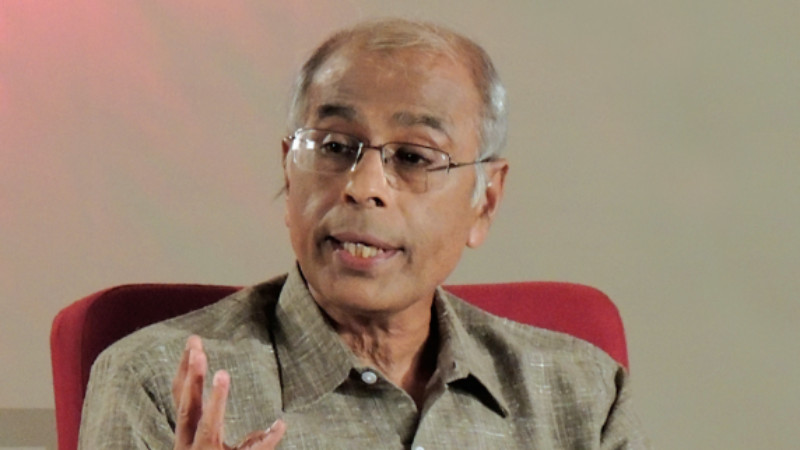
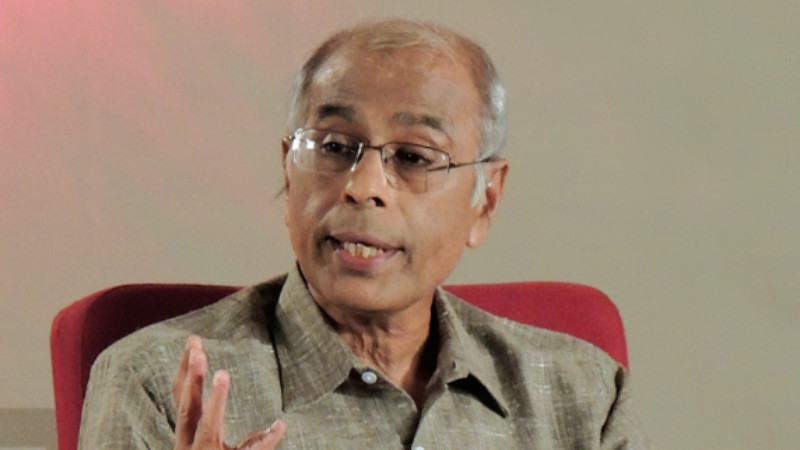
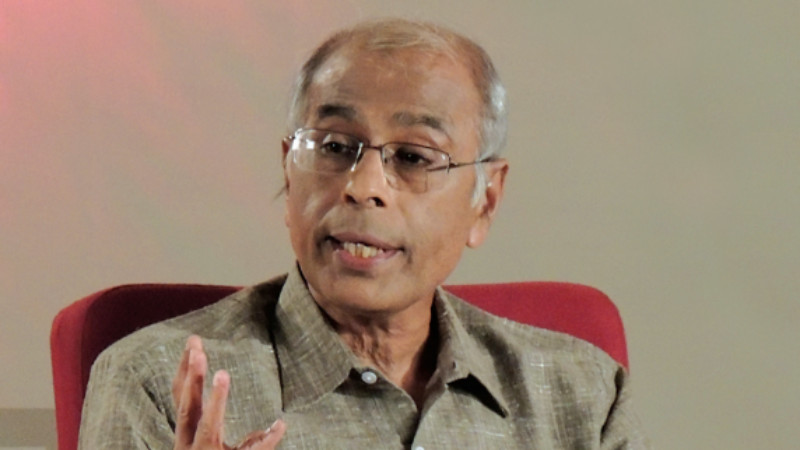
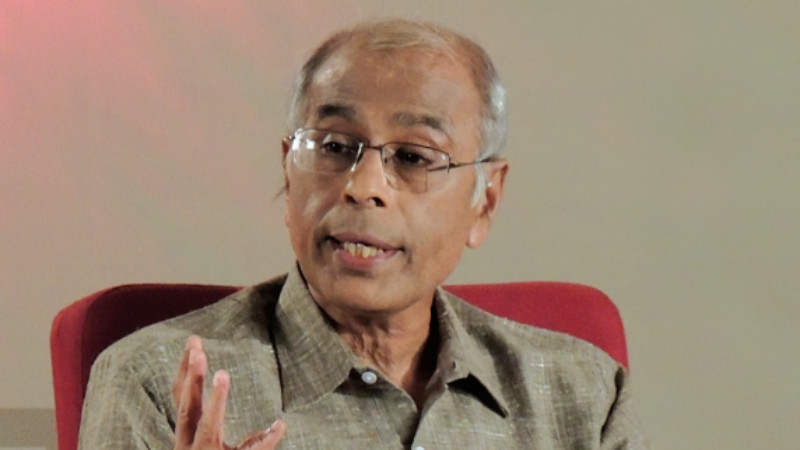
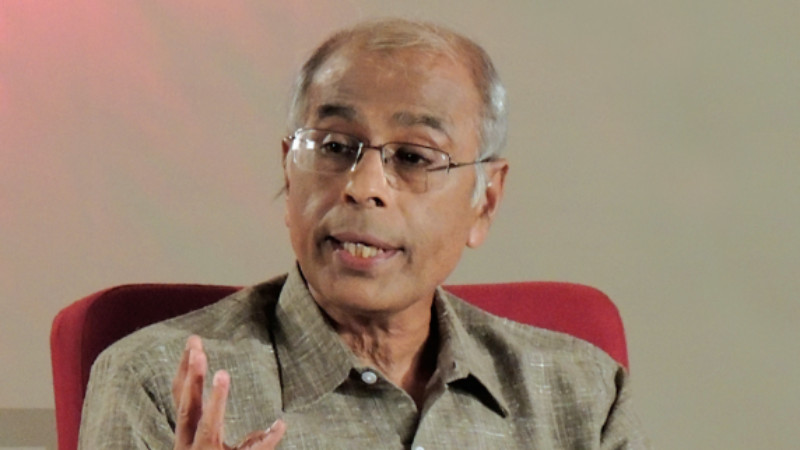
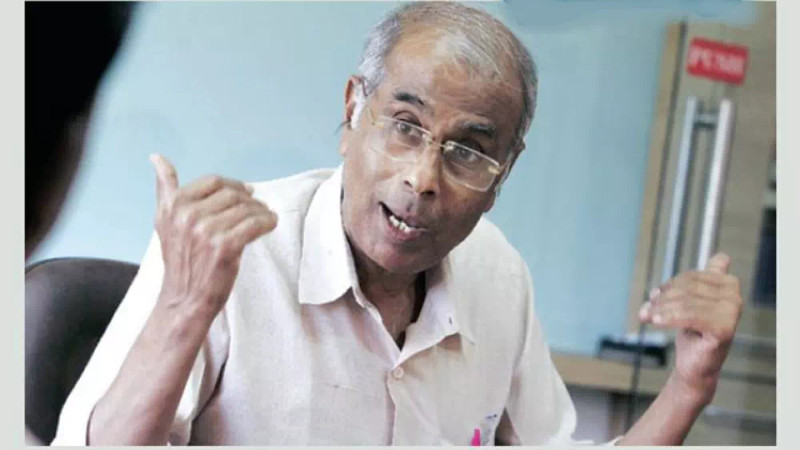


























Add Comment